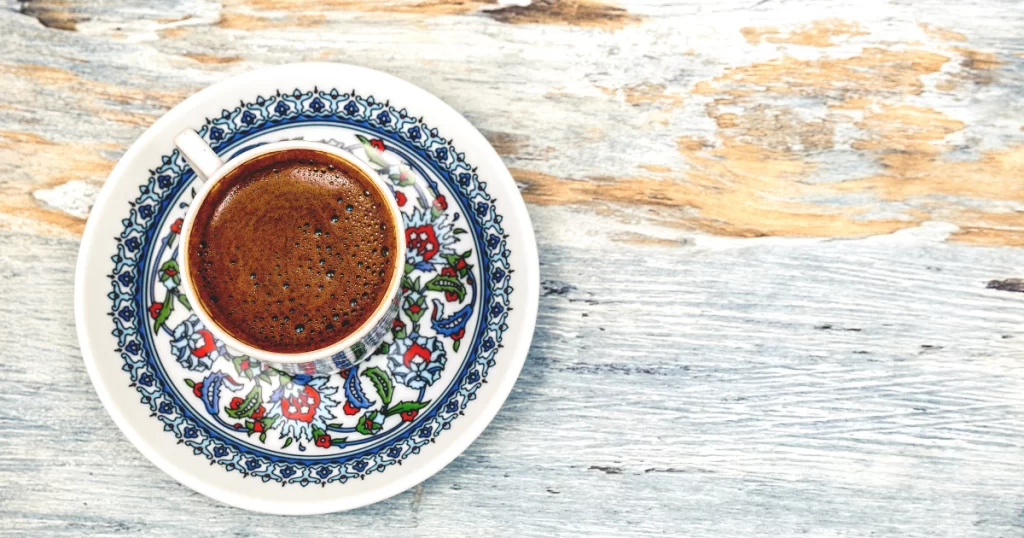Ever wondered how Turkish coffee, one of the oldest coffee brewing methods in the world, truly tastes?
It’s a fascinating blend of intensity and richness. This type of coffee has a unique, foamy texture, and it’s often described as having a robust, thick, and almost chocolatey flavor that lingers on the tongue long after your last sip.
In this blog, we dive deeper into what makes Turkish coffee a standout, why its taste is so distinctive, and how cultural traditions contribute to its unique profile.
This article is a must-read if you’re curious about the distinctive features of Turkish coffee.
Does Turkish coffee taste like espresso?
One of the common misconceptions about Turkish coffee is that it tastes like espresso. They are not remotely similar.
Espresso has a unique taste that is intense and bitter, with a creamy texture and a strong aftertaste. On the other hand, Turkish coffee has its own identity with an earthy aroma that fills your nostrils as soon as you open the package.
It has an intense flavor that’s slightly sweet and nutty. The texture of this history-rich coffee is also different from espresso: it’s thick.
Is Turkish coffee bitter?
Turkish coffee is not bitter, it is bold and intense. Those who describe it as bitter probably have never had a properly brewed cup of this coffee.
A proper cup of Turkish coffee is brewed slowly over low heat with finely ground beans. The key to avoiding bitterness is to make sure the water used in the brewing process is not too hot, to avoid stirring the coffee once it starts to boil, and to remove it at the perfect time when the foam has the caramel color.
Another common mistake that leads to bitterness is using low-quality beans. Just like any other type of coffee, the quality of the beans used plays a huge role in determining its taste. You can find here the best Turkish coffee brands.

Is Turkish coffee sweet?
There are ways to add sweetness to your cup if you so desire. One common way to sweeten Turkish coffee is by adding sugar during the brewing process.
This can be done by adding a teaspoon of sugar per cup of water into the ibrik (the small copper pot traditionally used to make this type of coffee) before heating it up.
Pro tip: Adding too much sugar will alter the flavor profile of the coffee and may mask some of its natural bitterness. In my opinion, I prefer it without any added sweetness.
Natural bitterness and earthy flavor notes are what make this type of coffee so unique and enjoyable. However, if you’re someone who prefers their beverages on the sweeter side, don’t be afraid to experiment with different levels of sweetness until you find what works best for you – after all, isn’t taste subjective?
Why is Turkish coffee so thick?
In Turkish coffee, there are more particles and sediment present in the final product, which contributes to its thickness. Another factor that contributes to the thickness of this coffee is the brewing method itself.
I believe that tradition plays a significant role in why it is so thick. For centuries, this type of coffee has been an integral part of Middle Eastern culture and hospitality.
It’s served in small portions and sipped slowly as a way to socialize with friends and family while enjoying its rich flavors and aromas.
While some may find the thickness off-putting at first glance or sip, I think it’s what makes this type of brew so unique and enjoyable for many people around the world.

Does Turkish coffee expire
Turkish coffee can’t expire. It does not go bad or stale. Instead, it simply loses its freshness over time and becomes less flavorful.
Pro tip: Store your coffee properly and try to finish the package within a few weeks so it doesn’t lose flavor.
How to properly store Turkish coffee
Firstly, make sure to keep your Turkish coffee in an airtight container. This will prevent air from seeping into the container and affecting the flavor of your coffee.
Plus, an airtight container will keep moisture at bay, which is especially important for preventing spoilage. Secondly, avoid storing your coffee in the refrigerator or freezer. While this may seem like a good idea for keeping the coffee fresh, it can actually have the opposite effect.
Store it away from heat sources such as direct sunlight or near appliances that generate heat.
The intensity levels of Turkish coffee
Turkish coffee is strong, but if we consider the caffeine, espresso wins. However, It’s common to associate strength in coffee with its caffeine content, but in the case of this type of coffee, it’s more about its bold, robust flavor rather than its caffeine punch. Here you can read more about how strong Turkish coffee is.
Conclusion
Whether you like it sweet or bitter, thick or light, the Turkish coffee experience is one that should not be missed. If you have never tried it before, I highly recommend it.
The preparation process itself is an art form, and the ritual of serving and drinking the coffee creates a sense of community and connection. It’s not just about the caffeine boost – it’s about taking a moment to slow down and savor life.
In terms of taste, it delivers a rich flavor profile that sets it apart from other coffees. Its earthy notes are balanced by hints of sweetness, acidity, and bitterness in perfect harmony.
The texture is thick yet smooth, creating a velvety mouthfeel that lingers on your tongue.
My journey through renowned bars and coffee shops over five years, as a barista, coffee aficionado, and former bartender, has honed my pursuit for the perfect cup. My passion for coffee isn’t just about the brew—it’s about sharing the knowledge and insights I’ve gleaned along the way.



